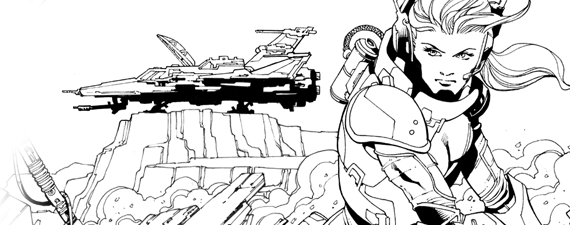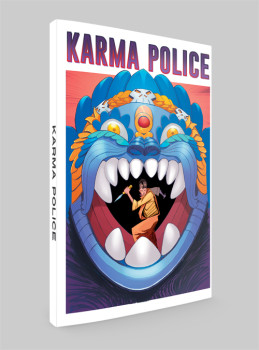We’re ecstatic to report that, as of March 31, the Kickstarter campaign for the collected edition of Chris Lewis’ Karma Police exceeded its $3,000 target goal! By over $1,000, no less.
This will likely come as little surprise to anyone who has checked out the series over on comiXology! Fanboy Comics’ Barbra Dillon recommends it as “a fantastic series that is definitely worth a try!” Chris is joined on his crazy, frenetic ride through enchanted daggers, reincarnation, and creepy luchador demon children by Tony Gregori on art, Jasen Smith on colors, and fellow Creators Workshop member Nic J. Shaw on letters.
Comics Experience: What historical warrior monk traditions did you pull inspiration from when creating Karma Police?
Chris Lewis: My research mainly involved Tibetan Buddhism. With its warrior monks, mysticism, and crazy cosmology, it proved to be quite inspiring and overwhelming at the same time. I’m definitely no scholar, though, and didn’t set out to teach people about Buddhism. That would be doing a great disservice to a very complex and ancient religion. I just set out to explore some very basic, universal themes, added some Tibetan lama-fu and a touch of Wu-Tang with the title of a Radiohead song, and Karma Police was born.
CE: Were there any interesting elements of the “warrior monks, mysticism, and crazy cosmology” you wanted to incorporate, but had to leave on the cutting room floor because they didn’t quite fit?
CL: Definitely! I have a giant series bible for Karma Police, including a detailed timeline of events from the 9th century to the present. We’ve got Kublai Khan and the Mongols, an Indiana Jones-style adventure story set in 19th century Afghanistan, WWII-era Berlin and on and on. Yes, I’ve wasted a considerable amount of time thinking about these things.
CE: El Muñeco is such a bizarre, visually-striking, and memorable character. How did you conceive of and develop him?
CL: I just liked the idea of a boy with an oversized head and limp, noodle-ish body, who was raised in a bird cage and who liked playing with dolls. I think the first name I came up was El Chirpo. Or maybe Tweet Tweet. As with most of my characters, I have no idea where he came from, and I’m afraid to dig too deep.
CE: You just invoked the Streisand effect on yourself, because now we all want you to dig deep! But sometimes a boy with an oversized head and limp, noodle-ish body, who was raised in a bird cage and who likes playing with dolls is just a boy with an oversized head and limp, noodle-ish body, who was raised in a bird cage and who likes playing with dolls. Are there any characters whose creation you feel you are safe to discuss?
CL: Now I’m picturing myself with a fist in the air shouting, “I invoke the Streisand effect!” Might make for a good panel in my semi-autobiographical graphic novel.
I’ll tell you a secret about the creation of the main character Jack Allen. She used to be a he. When Tony and I started exchanging ideas back and forth, he asked me to consider the change in gender since he was tired of drawing the same heroic young white dudes all the time. At first I was a little apprehensive, as I’d already written the character as a male, and these things aren’t just superficial attributes you can change without affecting the story. But once I started thinking about it, it fit so well with Jack’s character development and the themes we were attempting to address. I went back to the script, rewrote all Jack’s dialogue and fundamentally examined her relationships to the other characters. The story flowed so naturally afterwards, which proves to me that we made the right decision.
CE: Karma Police plays with some riveting but extremely heavy concepts, like certain acts of killing as a sort of compassionate euthanasia. In your planning and writing, how did you consciously maintain the balance between peace and chaos that’s necessary to the story? No spoilers, naturally.
CL: This was the central challenge to the entire story. I think with everything you write, you’ve got to look at the central theme, explore how you feel about it, and try to distill those thoughts without coming across as too melodramatic. With Karma Police, I was constantly faced with an almost unconscious desire to let the characters apply some clichéd ultra-violence and wrap things up, despite the fact that I was working against that same train of thought in the book itself.
CE: As the veteran of many successful Kickstarter campaigns, what have you learned from project to project? What knowledge can you share with other creators who may want to go the crowdfunding route?
CL: You make me sound like Jimmy Palmiotti! I’ve actually only done two Kickstarter campaigns, and don’t want to jinx myself with Karma Police as it still isn’t 100% funded at this point. [Note: As of this writing, the campaign has been fully funded! Clearly interviewing with us didn’t hurt Chris’ chances.] The biggest thing I’ve learned is that I consistently underestimate how much of my energy it’s going to drain. These things are physically demanding in that you need to dedicate a lot of time to the initial research, design, and promotion, and then during the campaign you have to promote/annoy, keep in touch with backers, promote/annoy even more, etc. But even more so (for me at least), these campaigns are giant emotional roller coasters.
I’m sure I’m insufferable during a campaign, and seeing how they tend to run for 30 days, I’m lucky that my friends and family are still willing to talk to me. Maybe my advice would be to not stress so much, but as I understand how important these campaigns are in helping people realize their dreams, that advice probably just stinks.
CE: No, not at all. “Don’t stress out” is generally pretty solid advice – it’s great for mental and physical health alike. What do you do to stay calm while you run campaigns?
CL: Oh, I don’t follow that advice at all! I wish I could stay calm during a campaign, but I build it up so much beforehand that it feels like my life is going to be ruined if it doesn’t succeed. RUINED! Which is just total garbage.
CE: How did your participation in the Creators Workshop help you with the creation of Karma Police? What was some of the best advice you received?
CL: Karma Police was created in the Creators Workshop! An earlier version of the script was one of the first things I posted for critique when I joined CE back in 2010, and all the current scripts were hammered into shiny shape by CE’s workshop warriors. With all that input, it’s quite difficult to choose one piece of advice, but I’ll go with something that series editor (and CE Communications Manager) Nicole Boose told me, which was that I should clearly define the rules of the world early on in the story. With so many crazy elements floating around, we were running the risk of confusing the reader and thereby diverting them from far more important issues such as theme, emotional journeys, and child demons slurping yak milk.
CE: Do you think the advice about not confusing the reader also helps you focus when outlining and writing your stories?
CL: It is relevant advice for every step of the creative process. I’m constantly telling myself to keep it simple, and I’ve gone from ignoring that completely to listening about 75% of the time.
Karma Police is also available on comiXology.


